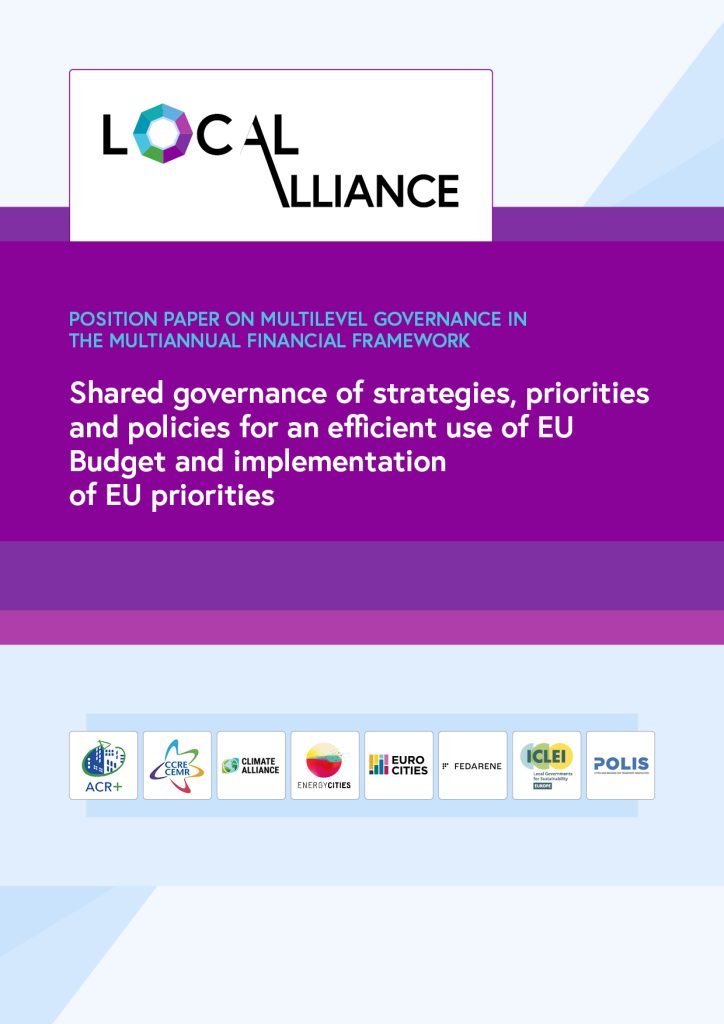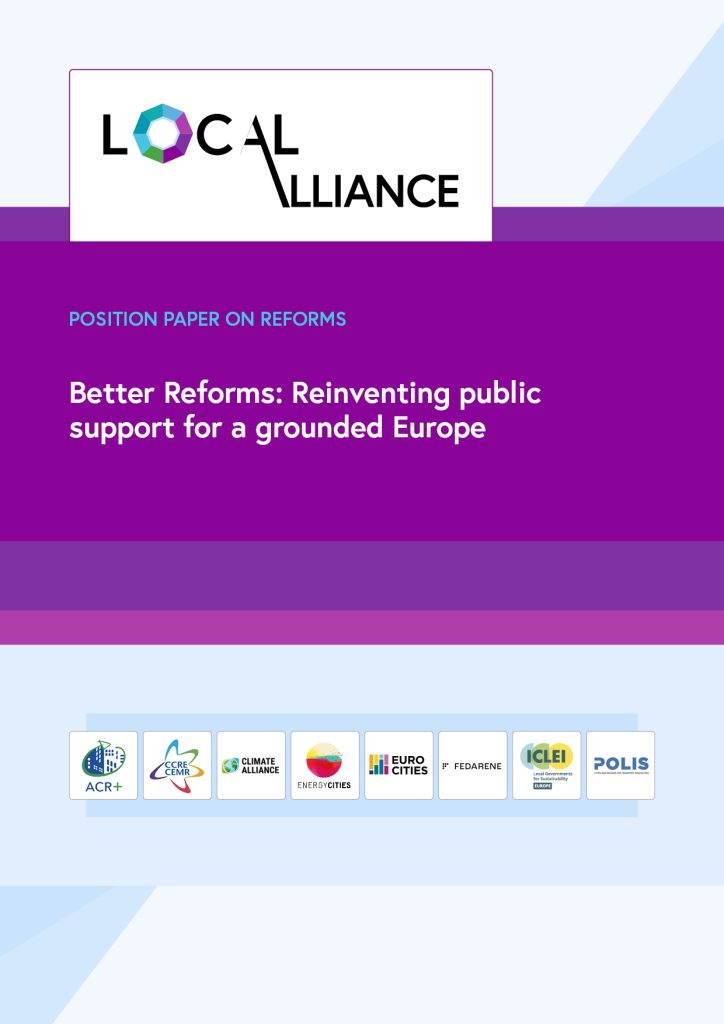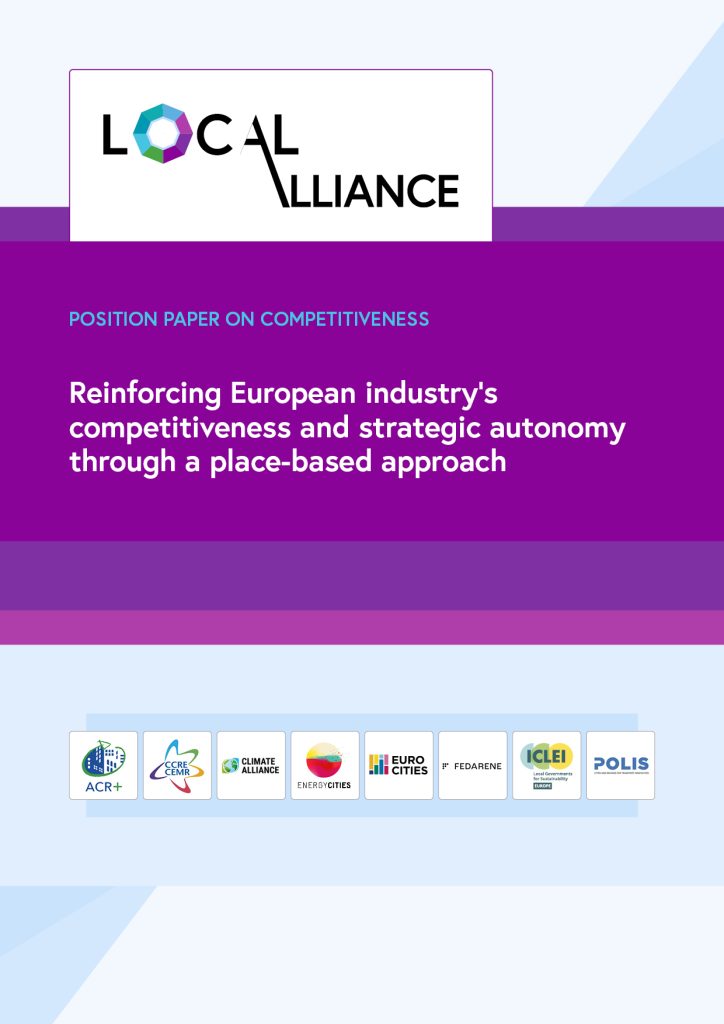Local Alliance puts forth concrete recommendations for an EU budget fit for future
The eight networks jointly published three papers calling for a better reform agenda, shared governance and a place-based approach to competitiveness
The future of the EU budget is critical for building Europe’s resilience, cohesion and competitiveness. Faced with unprecedented challenges, from increasing climate risks to geopolitical uncertainty, local and regional governments are essential to delivering Europe’s priorities.
They build resilience locally to cushion growing climate risks and ensure energy security through local renewable production. They channel billions into sustainable infrastructure and public services and act as first respondents to disasters, providing a safety net in times of crisis. They ensure access to affordable housing while also creating hubs of innovation and activity. Local and regional authorities are key partners to achieving a prosperous Europe, where people want to live, work and thrive.
To deliver on the EU’s priorities – ensuring competitiveness, resiliency and security – the future EU budget needs to count on local and regional governments. And for this, a bold reform needs to take place.
That’s why the Local Alliance – a coalition of Europe’s eight major networks of local and regional governments – has come together to respond with one unified voice to the European Commission’s public consultation on the next EU budget.
The joint position papers call for three critical reforms to ensure the next Multi-annual Financial Framework (MFF) delivers real results:
- Making multilevel governance a core principle by going beyond the current shared management and partnership principle
- Rooting the EU project in our cities and regions by designing a better reform agenda across levels of government – together
- Reinforcing Europe’s industrial competitiveness and strategic autonomy through a place-based approach, rooted in all our cities and regions no matter where in Europe
1. A shared governance of strategies, priorities and policies

The first paper focuses on multilevel governance, urging a step-change in how multilevel governance is applied to the EU budget.
Multilevel governance should be fully mainstreamed across all relevant elements of the next EU budget – from the earliest design of the MFF, through program planning and implementation, to monitoring and evaluation.
The Local Alliance calls on the European Commission to:
- Include local and regional governments in the MFF design and decision-making.
- Empower local governments in implementation and monitoring of EU funds.
- Align multilevel governance structures between sectoral legislation and the MFF.
- Ensure effective funding delivery and accessible finance at the local level.
2. Rooting the EU project in our cities and regions with a better reform agenda

The second paper focuses on designing better reforms to reinvent public support for a grounded Europe.
The future EU budget aims to link investment with reform, following the model of the Recovery and Reslience Facility.
While not all reforms are local in nature, it is essential that local and regional governments have a seat at the table on the reforms that are important for their mandate and competencies when the “Menu” of Reforms is discussed between the European Commission and national governments.
Excluding local and regional governments from defining possible and adequate reforms risks missing critical policies, failing to identify and effectively address local gaps, and setting the wrong priorities.
The Local Alliance calls on the European Commission to:
- Define the “Menu” of Reforms with all levels of government.
- Guarantee local democracy, protecting local elected representatives, encouraging citizens’ assemblies and fostering transparency.
- Invest in capacities in municipalities and regions, with a dedicated reform and earmarked budget to develop and maintain local expertise and build on the cooperation at local level.
- Unlock public investment capacities, going beyond the current public finance rules, assessing local governments’ financial situation both on the capacity of the investment to generate future revenue, limit future public spending and build on future local resiliency.
3. Reinforcing industrial competitiveness through a place-based approach

The third paper focuses on reinforcing European industry’s competitiveness and strategic autonomy through a place-based approach.
European cities and regions are at the heart of the European Union’s competitiveness. Their investments account for about two thirds of the increase in total public investments in the EU in 2023, mostly in key sectors like energy, social affairs and transport.
They play a pivotal role in shaping the conditions for industries and businesses through land-use planning, infrastructure development, education, housing, research, training, and the quality of life. Cities, regions and their energy agencies across Europe also support SMEs and large industries in increasing their competitiveness through tailored programmes for innovation and decarbonisation.
At the same time, cities and regions act as key demand drivers for clean and low-carbon materials and products, especially in transport, buildings, and energy sectors. By sending clear market signals to clean industries in Europe (“Buy European”), cities and regions contribute to a mutually beneficial dynamic that advances economic, social, and environmental goals together.
The Local Alliance calls on the European Commission to:
- Ensure local and regional governments’ and authorities’ access to the future EU Competitiveness Funds.
- Enhance territorial approach and multilevel governance, especially through the Competitiveness Coordination Tool.
- Strengthen EU Competitiveness through Cohesion Policy.
- Leverage public procurement for strategic impact.
- Recognise the vital role of cities and regions in research, innovation and market uptake.
- Support cross-border collaboration.
